610 Search Results for visual support
April 13, 2016
by Carole Zangari -
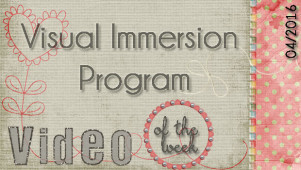
April is a great month to expand our understanding of how to support individuals with autism. In this week’s featured video, we learn about the Visual Immersion Program from Dr. Howard Shane, James Sorce, and Meghan O’Brien. Many thanks to the AAC-RERC for making this available.
October 22, 2015
by Carole Zangari -
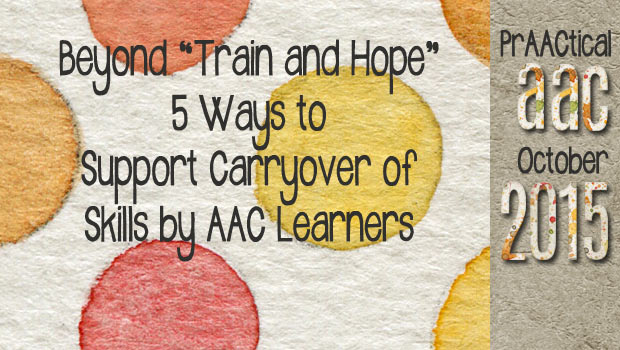
With her SLP, Marissa conjugates verbs and includes function words to make the sentence grammatically correct (e.g., “She is going home with me”). With others, she tends to use her AAC more telegraphically (e.g., “She go home me”). In therapy, Marcus uses his AAC to create 3-4 word sentences. In the classroom, he communicates mostly in single word utterances. Sound familiar? Marcus and Marissa have both learned skills in therapy sessions that they are not using in their daily lives. Data from their therapy sessions show that these students have mastered the target language skills, so the SLP is understandably disappointed when they revert back to using less sophisticated utterances in the classroom. Problems with carryover and skill generalization are not unique to AAC. Ask any SLP who does articulation therapy or teaches kids who stutter how to speak more fluently. Getting them to use the skills demonstrated in... [Read More...]
April 30, 2015
by Carole Zangari -
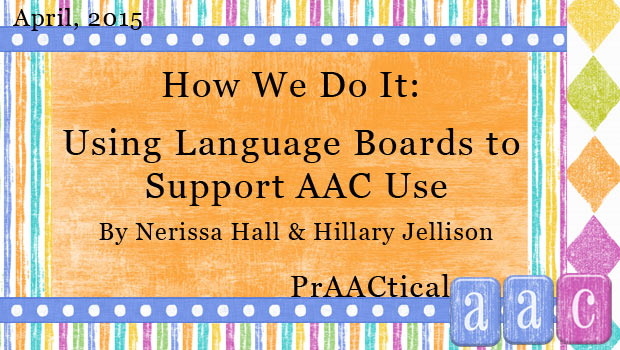
Many of you have reached out to say how much you’ve appreciated the prAACtical suggestions provided by Nerissa Hall and Hillary Jellison, New England-based SLPs and owners of Commūnicāre, LLC. We’re excited to have them back, especially because they are talking about something near and dear to our hearts: Implement a core vocabulary approach in their AAC therapy. In this post, they give us a peek into the ‘why’ and ‘how’ of making and using communication boards that are rich in core words. In their typically generous fashion, they also share templates for the boards that they make. How We Do It: Using Language Boards to Support AAC Use There are a number of different strategies one can use to support an individual’s use of augmentative and alternative communication (AAC). We know that aided language stimulation, augmented input, and AAC modeling are important and effective ways of supporting AAC use. By using... [Read More...]
August 12, 2014
by Carole Zangari -
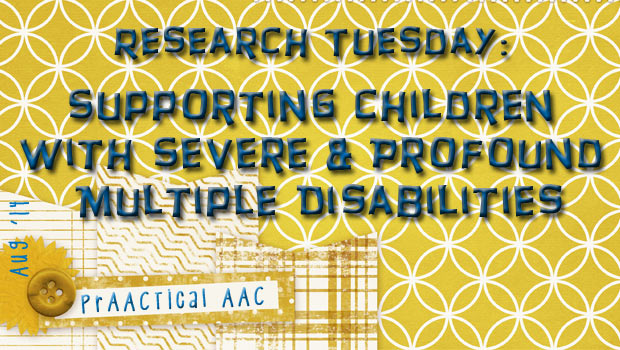
What do we know about the best ways to provide communication support to individuals with severe and profound multiple disabilities (PMLD)? PMLD is a term that generally refers to people who experience profound cognitive limitations in addition to sensory and/or physical disabilities. Many of these individuals have complex medical histories and chronic health concerns. Often, the communication difficulties experienced by individuals with PMLD cause them to be isolated and excluded from many social and educational opportunities. Despite their many challenges, there is evidence to suggest that AAC supports can help these children develop their communication skills. Not much is known, however, about how to structure the AAC intervention to maximize learning. In this study, Harding and her colleagues sought to reduce isolation and promote personal autonomy by providing AAC supports to two children with PMLD. As other researchers have demonstrated the positive impact of AAC on people with PMLD, this... [Read More...]
July 8, 2014
by Carole Zangari -
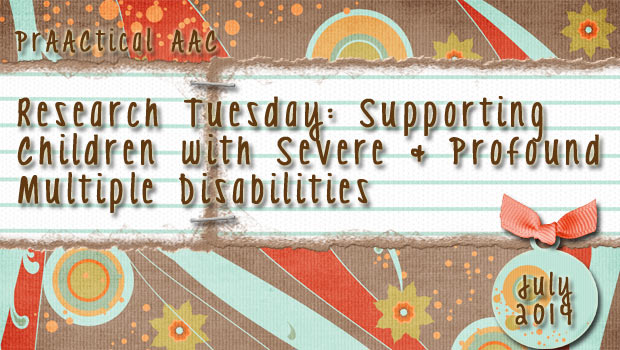
What do we know about the best ways to provide communication support to individuals with severe and profound multiple disabilities (PMLD)? PMLD is a term that generally refers to people who experience profound cognitive limitations in addition to sensory and/or physical disabilities. Many of these individuals have complex medical histories and chronic health concerns. Often, the communication difficulties experienced by individuals with PMLD cause them to be isolated and excluded from many social and educational opportunities. Despite their many challenges, there is evidence to suggest that AAC supports can help these children develop their communication skills. Not much is known, however, about how to structure the AAC intervention to maximize learning. In this study, Harding and her colleagues sought to reduce isolation and promote personal autonomy by providing AAC supports to two children with PMLD. As other researchers have demonstrated the positive impact of AAC on people with PMLD,... [Read More...]
May 7, 2014
by Robin Parker -
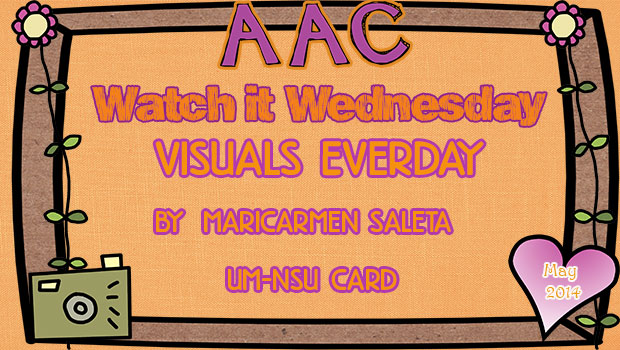
We believe all months and days should be dedicated to better speech (communication) and hearing. However, May is the official Better Speech and Hearing Month. With that in mind, no-tech visual supports help us all have better understanding and expressive communication. Watch the University of Miami and Nova Southeastern University- Center for Autism and Related Disabilities (UM-NSU CARD) webinar by Maricarmen Saleta as she gives great explanations and examples of ‘Visuals Everyday’. Direct Link: http://umnsucard.adobeconnect.com/p59bqo69epm/
May 5, 2014
by Carole Zangari -
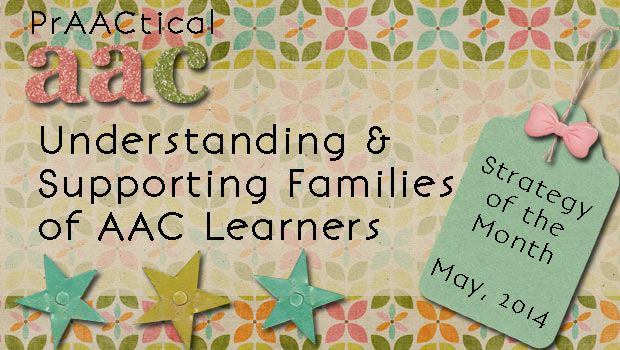
Let’s start with a basic premise: We can’t maximize AAC learning outcomes unless we’re working well with families. This is easier said than done, especially in some settings. As a clinician in a university clinic, for example, seeing families is the norm. We get to interact with them before and after the therapy. They get to observe or participate in the session. We can show them the data, observe how they interact with the AAC user in their family, and answer questions as they arise. And even with all of that, supporting them is challenging in that it takes time, skill, and planning. Although it is one of our favorite things to do, it’s not always easy to align our actions with our (stellar, ambitious) intentions. Multiply that by a factor of a zillion for our colleagues in schools and other settings where frequent, casual interactions are difficult to come... [Read More...]
April 3, 2014
by Carole Zangari -
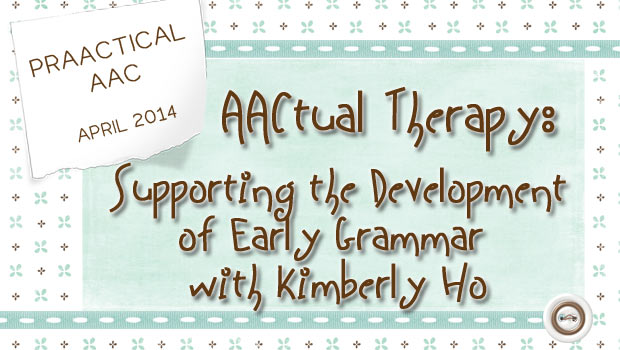
Our guest post for today is from SLP Kimberly Ho, an AAC specialist who operates a private practice, AAC Services. I met Dr. Ho many years ago when she was getting her master’s degree at Purdue University. She went on to get her doctorate and now consults for a number of public schools and works with individuals with AAC needs from preschoolers to adults. Kimberly is active in teaching (undergraduate and graduate courses), writing (published three articles in peer reviewed journals) and public speaking (15 presentations at regional, national and international conferences). In this post, she discusses some concepts in teaching grammar to people who are learning AAC. Traditionally, individuals with complex communication needs (CCN) were provided with communication boards or speech generating devices (SGDs) filled with topic specific vocabulary often called fringe words. The field of AAC is only just beginning to provide early communicators with access to Core... [Read More...]
February 11, 2014
by Carole Zangari -
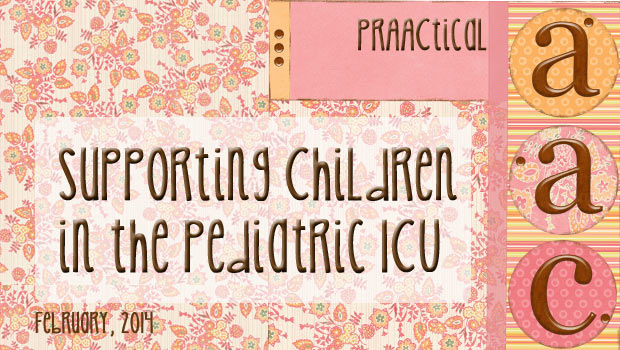
If there is anything scarier than having a very sick child in the ICU, it has to be when that child has no means of communication. In this Research Tuesday post, we join the efforts spearheaded by Rachel Wynn of Gray Matter Therapy to share an article that discusses the issues and presents some solution strategies. When we think of research studies in SLP, we think of experimental designs and randomized controlled trials (RCTs). In AAC, group research designs are uncommon because of the immense heterogeneity of this clinical population. Even limiting the study to one single disorder and age group, say teenagers with dysarthria secondary to cerebral palsy, contains too much heterogeneity for most group research. Instead, we see more single subject design experimental studies (SSEDs) in AAC. When well-designed, SSEDs have strong experimental control and allow researchers to answer causal questions, such as “did the treatment (e.g., teaching... [Read More...]
January 16, 2014
by Robin Parker -
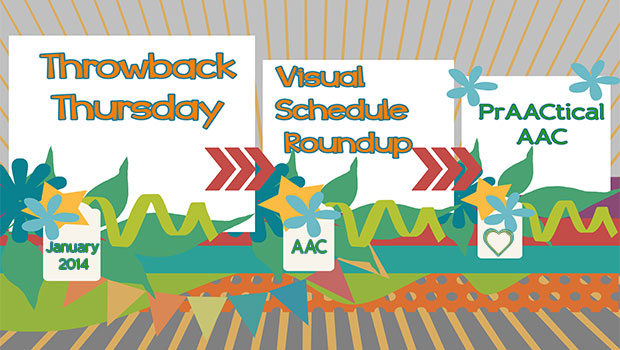
As times goes on in the academic year, we often think that everyone knows their schedules. But remember, knowing and seeing are two completely different things. For this Throwback Thursday, we wanted to go over visual schedules of all types to remind ourselves not to back off with schedules (all types) even if it seems everyone is transitioning well and knows their schedules. We wouldn’t want anyone to take away our day planner…. even when we knew our schedule. What’s the Connection- Core Words & Schedules Visual Schedules 411 Get Organized for the New Year: 5 Visual Schedule Apps Schedule Changes A Myth About Visual Schedules A PrAACtical Myth Lives On.. Again Visual Schedule Myths Live On and On… Power of the Visual Planner Schedules and Choices Riddle Me This AAC at Home: Visual Schedules and Supports Building Complex Schedules Ideas for Teaching the Use of Schedules PrAACtical Mini-Schedules Video... [Read More...]









